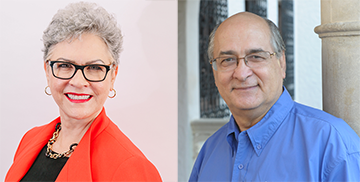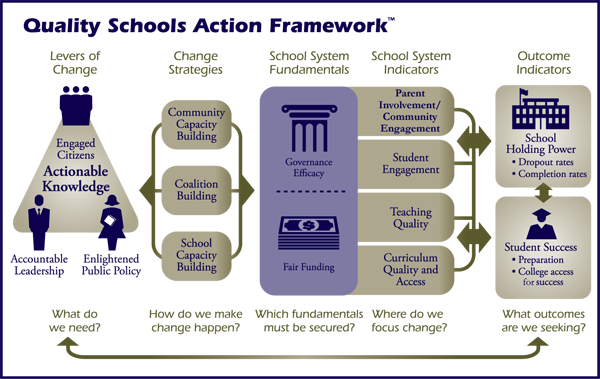by María “Cuca” Robledo Montecel, Ph.D., and Aurelio M. Montemayor, M.Ed. • IDRA Newsletter • June-July 2018 •

IDRA at 45 Years: Courageous Connections for Advocacy
Editor’s Note: Anniversaries make us pause and pull out memories. We think back about the early days when people joined together for a special purpose. For IDRA, that purpose has not changed. As long as excellence in schools is available to only a few students, IDRA has kept its purpose – its mission – to achieve equal educational opportunity for every child through strong public schools that prepare all students to access and succeed in college.
For this issue of the IDRA Newsletter, two of our own, whose passion has helped fuel our work over the years, took some time out to reflect on IDRA’s trailblazing work along six paths: the path to fair funding, the path to good educational practices, the path of valuing students, the path of valuing educators, the path of valuing families, and the path of systems change. Their three articles in this newsletter are accompanied by photos across the decades and a peek at an online timeline of IDRA’s policy work.
We are grateful for all who have been a part of this journey since 1973 when a small group of people set out to change the world.
Five years before IDRA’s founding, inequities in school finance and other areas had been the focus of hearings in San Antonio in December of 1968. Testimony was presented at Our Lady of the Lake University before the U.S. Commission on Civil Rights about the status of Mexican Americans in the Southwest. Two of the five days were dedicated to education. Dr. José A. Cárdenas, who would later found IDRA, and Mr. Aurelio Montemayor, who joined IDRA in 1975, were among the many who testified. The testimony gave a broad consciousness of the many challenges our students faced in schools and other institutions.
The commission found that school systems had not recognized the rich culture and traditions of students and had not adopted policies, programs and practices that would enable students to participate fully in the benefits of the educational process.
And while much has changed over the years, still today, compared to their more affluent peers, poor and minority students are far more likely to be assigned to classrooms with less qualified teachers and fewer opportunities to prepare for and take advanced and dual credit courses. And educational segregation is on the rise.
At the same time, we have seen that, by producing and leveraging a high-quality education for all students, we can leverage opportunity, if we know where and how to invest. The good news is that we do know where and how to invest in schools. When it comes to transforming education, we don’t need to take wild guesses; many educators are already showing what works.
The Path of Systems Change
Based on this empirical evidence and our 45 years of experience in the field, IDRA developed a change model that we call the Quality Schools Action Framework, that helps school, community, family and business leaders to assure that critical features are in place (Robledo Montecel & Goodman, 2010). The framework draws from existing theories that suggest that, because schools operate as complex, dynamic ecosystems, lasting systems change depends on sustained action within and outside of those systems.
Research on best practices of high performing schools, for example, has examined the links among a constellation of indicators (e.g., teaching quality and effective school governance; parent engagement and student success). Less examined, however, are the contextual and moderating factors that may impede or accelerate school system change. The Quality Schools Action Framework aims to bridge this gap.
The framework offers a way to assess school conditions and outcomes, identifying leverage points for improvement and informing action. In essence, the framework poses five key questions:
- What do we need?
- How do we make change happen?
- Which fundamentals must be secured?
- Where do we focus systems change? and
- What outcomes will result?
The Quality Schools Action Framework draws on current research and knowledge of the field. It also is intuitive and reflects common sense. For example, research and experience recognize that students are far more likely to succeed when they have the chance to work with highly qualified, committed teachers, using effective, accessible curricula; when their parents and communities are engaged in their education; and when students, themselves, are engaged in their learning. We also know that effective schools depend on good governance to guide their success and on fair funding to effectively serve all of their students each school day.
The framework is helpful in focusing actionable knowledge on transforming educational systems. Like ecosystems in the natural world and many successful business ecosystems, educational ecosystems have inputs, throughputs and outputs (Morgan, 2015). Layers and levels are integrated to form a complete ecosystem.

With this framework, we make the case for metrics that measure not only outputs, but also inputs and throughputs. Simply focusing on the educational outputs of student scores, for example, without giving focused attention to the inputs, such as fair funding and efficacious governance, and the throughputs of teaching quality and curriculum rigor, will not lead to transformation or the successful education of all children. Neither will excusing school failure based on characteristics of the students in the school.
If your flower garden stops blooming, you check the soil to see if it needs more or less water. Similarly for our classrooms, measuring outputs alone denies school leaders and communities the opportunity to know the reasons behind their results and to focus efforts on substantial improvement.
As in networked knowledge systems utilized in business, “Organizational knowledge resides in a complex network of individuals, systems and procedures, both inside and outside the organization.” (Homa & Evans, 2010)
Listen to a series of our podcast episodes featuring Dr. Robledo Montecel:
States must not only issue grades for school districts and campuses, as Texas is scheduled to do over the next couple of years but must link those grades to fair funding and availability of resources, student engagement, and curriculum offerings and rigor, among other factors.
Adaptable ecosystems also require core technologies that provide substance knowledge about the system. In this regard, IDRA’s experiences with technology have included evaluating the pedagogical and administrative value of large, comprehensive programs, such as PLATO. Critical thinking requires critical dialogue that does not replace the teacher with a piece of software. Yet our educators must adapt and extend their practice to include the media and instruments accessible to all children and to use technology to provide knowledge about educational inputs, throughputs and outputs in schools, districts and states.
IDRA’s use of technology has paralleled our work with organizing underserved youth to assist families in connecting to technology. The IDRA OurSchool website was built to provide key data for Texas school districts and high schools, including outcomes on ACT/SAT tests, college-sending rates, teacher certification rates, and district-level attrition rates (www.idra.org/OurSchool). Designed around IDRA’s Quality Schools Action Framework, the bilingual site provides key questions to promote community conversations and a framework that local, cross-sector partners can use to plan joint action to improve schools.
We’ve brought together communities of educators through online forums, such as our Equity Connection, where participants learn new strategies and share feedback and advice with each other (www.idra.org/equity-connection).
IDRA’s work also recognizes the complex network that is part of the education ecosystems in different contexts. Actionable knowledge has been a focus of IDRA-sponsored and -designed conferences and strategic convenings over the years.
Our work has seen the interplay and inter-relationship of policy, research and practice. We have experienced each informing and affecting the others. All-too-often, public education policy and practice are enacted and implemented without the benefit of research; breakthrough practices are isolated to individual classrooms; and the power of intergenerational family leadership in school transformation is muted or marginalized.
IDRA adopts border-crossing strategies that bridge the divides from research to practice and school to community. Through this cross-cutting approach, we work to secure sustainable solutions for schools and districts across states and nationally. IDRA conducts research, keeps up with relevant, strategic findings in the field, and questions research that is flawed, primarily because of deficit roots, questions and approaches.
As IDRA celebrates its 45th year and San Antonio is celebrating its 300th, we also are commemorating the 50th anniversary of the 1968 U.S. Commission on Civil Rights hearings at Our Lady of the Lake University. At the anniversary event on November 15-17, 2018, a major publication will synthesize what has happened and what remains to be done. IDRA staff is writing the chapter focused on education. Our IDRA history, experiences, findings and insights inform the education chapter of that publication.
Thousands of classroom teachers, principals, other educators, families, policymakers, community leaders, researchers and, of course, students themselves, have been part of the IDRA story. As a result, millions of student lives have been powerfully affected by dramatically raising educational opportunities for all children.
Four and a half decades ago, we thought that, in a few years, we would do what was needed to meet the challenges for our children to have access to excellent public schools. Today, we celebrate the progress we are achieving by working together and by taking a stand when others would not. Following is our promise letter to children.
Dear Children,
We see you. We value you. We cherish you.
We promise to provide you an opportunity to learn in your own neighborhood with caring and qualified teachers. We promise you a curriculum that truly prepares you for college, in an environment that respects you and values you and your background. We promise to engage you – not only academically – but as an active part of the community and life of school. And we promise to support the commitment of your parents to high quality education.
We promise to your families and communities… unwaveringly, we stand with you. Together, we will work fiercely to assure that youth, families and communities are heard – not as problems – but as partners in creating strong and vibrant schools. We promise to work with teachers and principals and superintendents and school boards to prepare all students so that we can all live in an America that keeps its promises to justice and opportunity. And we promise to tell the truth. We will share what we see honestly – to promote good and just public policy.*
We are still here because we haven’t achieved those goals. We won’t stop until we have.
Resources
Homa, B.J., & Evans, S. (2010). Super-Flexibility for Knowledge Enterprises A Toolkit for Dynamic Adaptation (New York: Springer-Verlag Berlin Heidelberg).
Morgan, J. (August 12, 2015). “The Innovation Ecosystem for the Future of Work,” Forbes.
Robledo Montecel, M., & Goodman, C.L. (Eds). (2010). Courage to Connect – A Quality Schools Action Framework (San Antonio, Texas: Intercultural Development Research Association).
* Closing letter reprinted from Robledo Montecel, M. (2017). IDRA 2016 Annual Report – Keeping the Promise; Putting Children First (San Antonio, Texas: Intercultural Development Research Association).
María “Cuca” Robledo Montecel, Ph.D., is President & CEO of the Intercultural Development Research Association. Comments and questions may be directed to her via email at contact@idra.org. Aurelio M. Montemayor, M.Ed., is an IDRA senior education associate. Comments and questions may be directed to him via email at aurelio.montemayor@idra.org.



